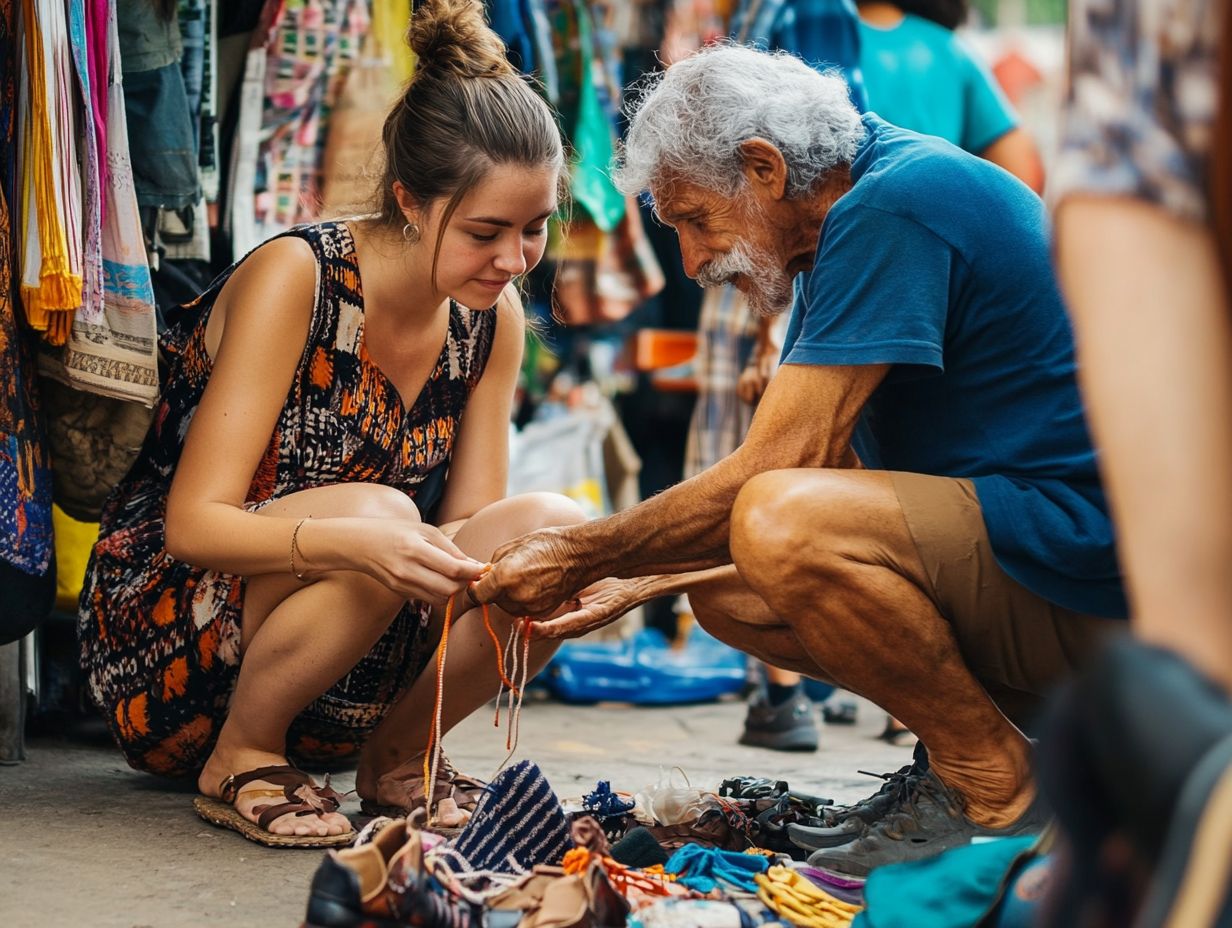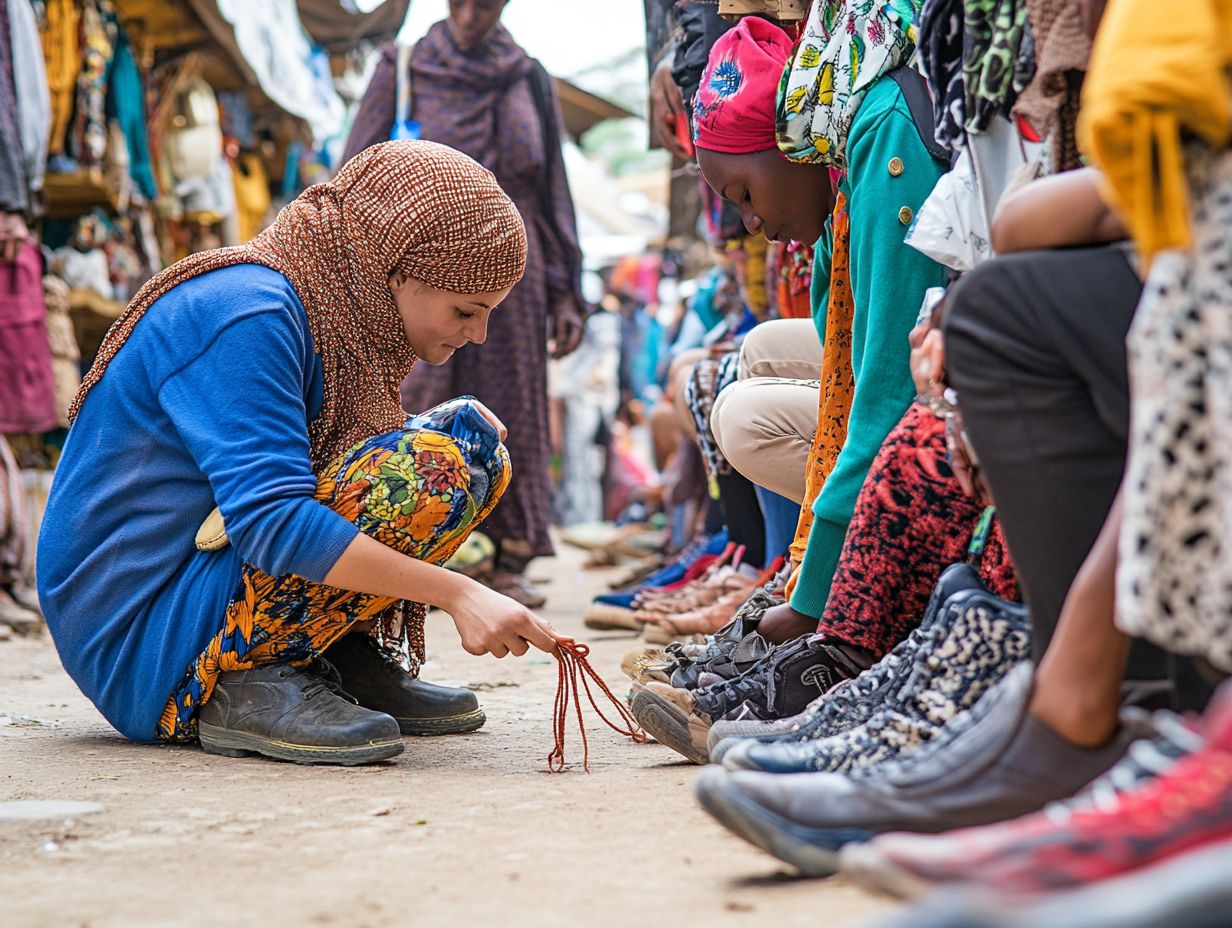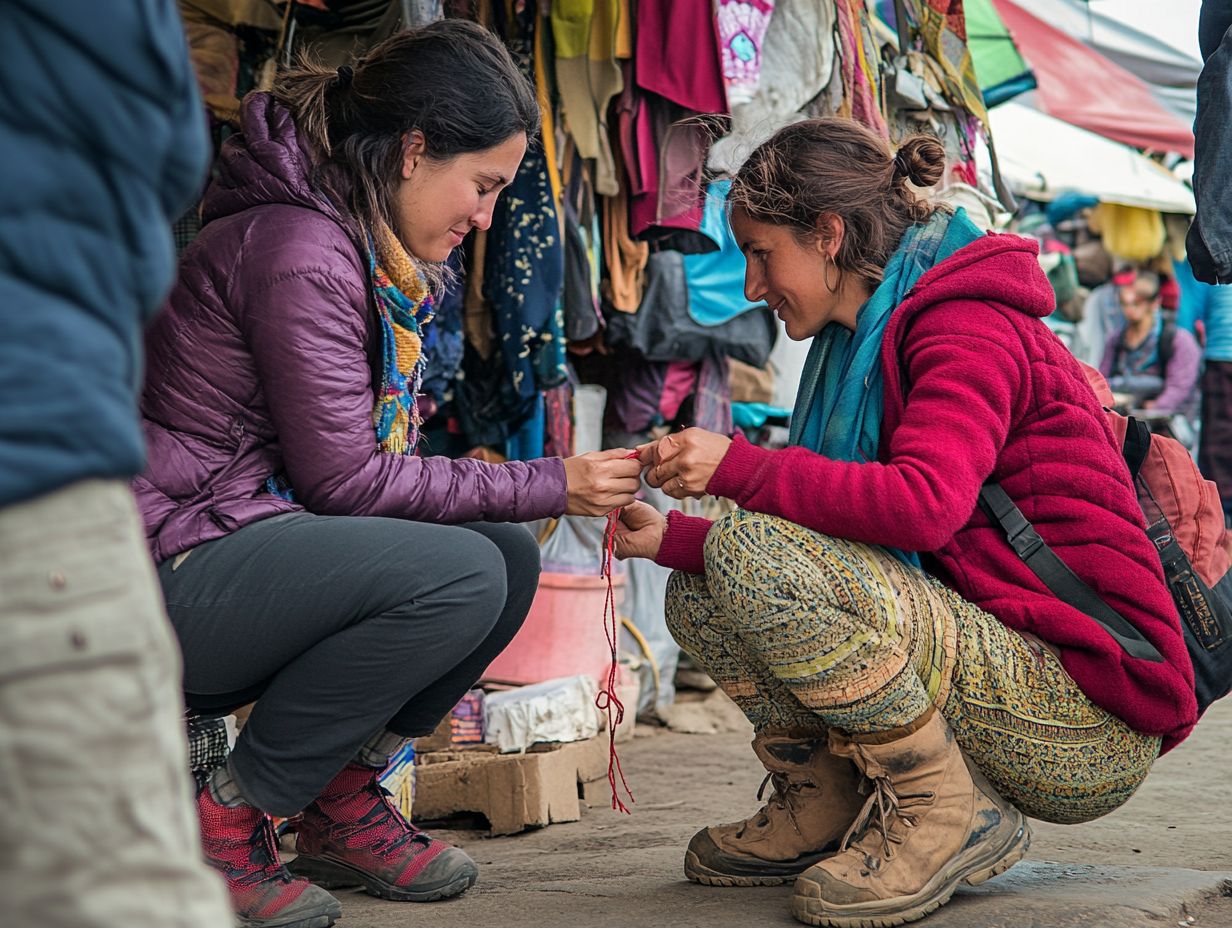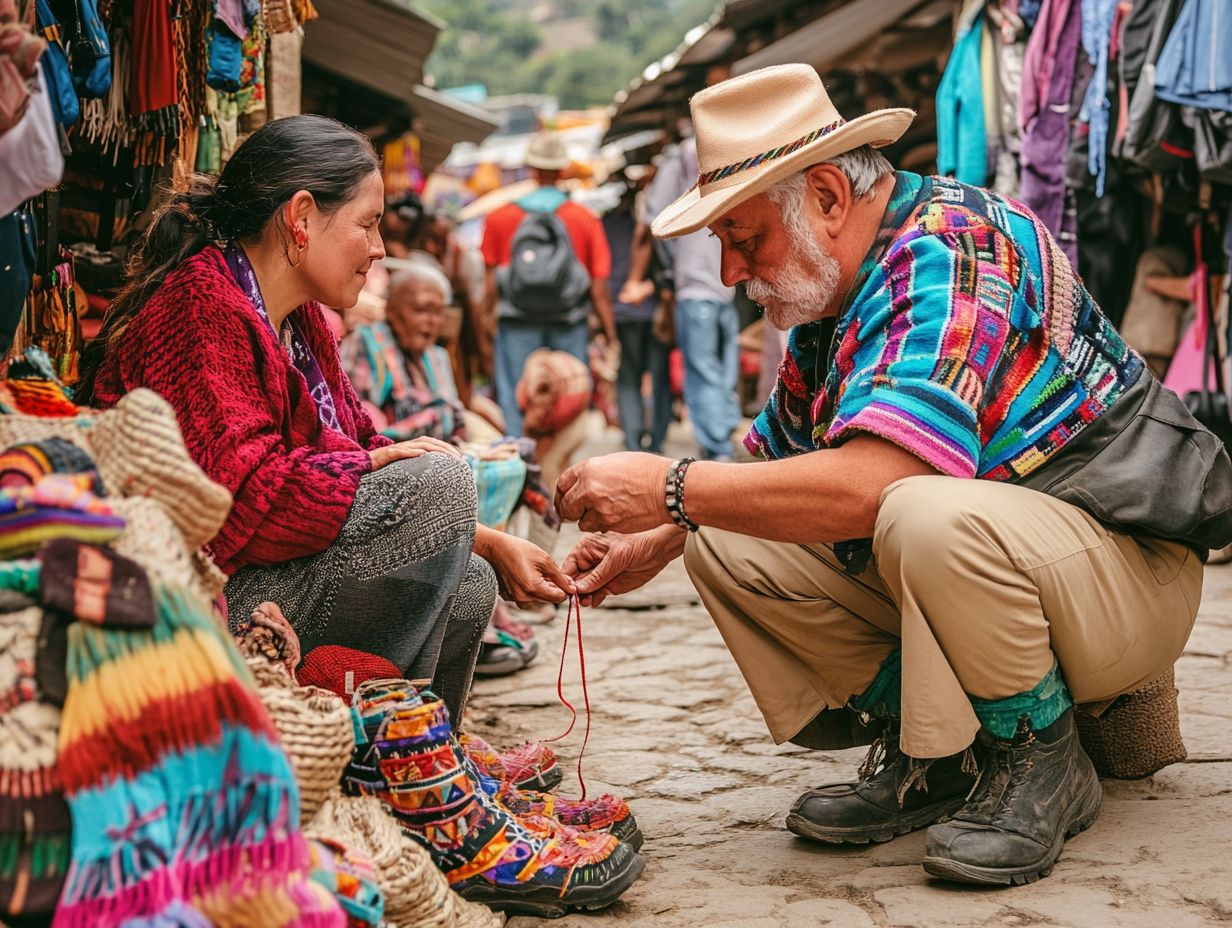Cultural Etiquette Tips for Shoestring Travelers
Cultural etiquette is more than rules. It helps you connect with people and enjoy your travels.
Understanding greeting customs and dining behavior can enhance your interactions. You ll create memorable experiences that last long after your trip.
This article explores the benefits of cultural etiquette. It also offers tips for researching local practices before your next adventure.
Prepare to transform your travel experience in ways you never imagined!
Contents
- Key Takeaways:
- Understanding Cultural Etiquette
- Benefits of Practicing Cultural Etiquette
- Common Cultural Etiquette Practices
- Researching Cultural Etiquette Before Traveling
- Frequently Asked Questions
- What is cultural etiquette and why is it important for shoestring travelers?
- How can I learn about cultural etiquette before traveling to a new destination?
- What are some common cultural etiquette tips for shoestring travelers?
- Is it appropriate to haggle over prices in certain cultures?
- What should I do if I accidentally offend someone with my behavior?
- How can I show respect for a culture while on a shoestring budget?
Key Takeaways:

- Understand the importance of cultural etiquette when traveling on a budget.
- Practice cultural etiquette to enhance your travel experience and foster positive interactions with locals.
- Researching cultural etiquette before your trip can help you navigate greeting customs, table manners, and gift giving with ease.
Understanding Cultural Etiquette
Understanding cultural etiquette is vital for international travel, especially when traveling on a shoestring. It leads to meaningful interactions and reduces misunderstandings.
Every country has its own cultural guidelines. These cover everything from dining habits to how to greet people.
Being respectful and open helps you navigate social norms easily. This enriches your experience and builds better relationships between cultures.
Benefits of Practicing Cultural Etiquette
Practicing cultural etiquette can elevate your travel experience. You’ll foster positive interactions with locals, creating goodwill and avoiding misunderstandings. To enhance your journey further, consider traveling on a shoestring to avoid tourist traps.
This awareness not only enhances your journey but also promotes appreciation for different cultures.
Enhancing Travel Experience
Enhancing your travel experience means immersing yourself in local customs. Learning about traditions and languages shows respect for the cultures you encounter.
Engaging in local customs builds deeper connections. Simple gestures, like greeting locals in their language, can create memorable interactions.
Observing local behaviors during meals or events offers insights into their values. Using basic phrases can make locals feel appreciated and lead to a more fulfilling travel experience.
Fostering Positive Interactions

Fostering positive interactions during your travels is essential. It largely comes down to respectful communication and understanding various social norms. Recognizing local gestures and adapting to each country’s unique etiquette enhances your relationships with locals. This makes your travel experience richer and more enjoyable.
When you engage thoughtfully with cultural nuances, you ll find a deeper connection to your surroundings. For instance, a simple smile or nod in one region can carry profound significance in another.
Misinterpreting gestures can lead to unintentional offense. This highlights the importance of cultural sensitivity, or being aware of and respecting different cultural practices. By adjusting your communication style to align with local expectations, you can foster goodwill and open the door to authentic interactions.
Investing time in learning about local customs and practicing respectful dialogue not only enriches your travel experiences but also contributes to a more harmonious global community.
These meaningful exchanges turn your travels into unforgettable adventures.
Common Cultural Etiquette Practices
Common cultural etiquette practices differ greatly from one region to another. They often encompass key elements like greeting customs, dining etiquette, and gift-giving traditions that embody local values and beliefs.
Explore these practices when you travel to Turkey, China, or Thailand. They will enrich your experience and foster mutual respect.
Greeting Customs
Greeting customs vary greatly from country to country. They reveal deeper social norms and values. For instance, in the United States, a handshake is typically the norm, while in Japan, bowing takes precedence. This highlights the necessity of understanding personal space and context when engaging with others.
In Germany, greetings usually include a firm handshake and direct eye contact. This conveys confidence and sincerity. This is quite different from the more laid-back approach in France, where cheek kissing is a common practice though it varies depending on the region and the relationship between the individuals involved.
In Nepal, the traditional greeting of ‘Namaste‘ involves a slight bow and the pressing of palms together, symbolizing respect and an acknowledgment of the divine in everyone. Such variations showcase the rich tapestry of social interaction worldwide and illustrate how these practices help to strengthen community bonds and reinforce individual identities.
Table Manners
Table manners and dining etiquette are essential elements of cultural etiquette. They influence how meals are shared and appreciated across diverse cultures. By understanding local dining customs such as appropriate dress codes in religious settings or the meanings of gestures during meals you can significantly enhance your dining experiences in countries like Italy, India, or Indonesia.
For example, in Italy, it s customary for you to wait for the host to serve food or indicate when it s time to start eating. Family-style dining there often emphasizes sharing and a sense of community.
In India, you ll find that removing your shoes before entering someone’s home is a common practice, symbolizing respect. Meanwhile, in Indonesia, keeping both hands above the table while dining reflects modesty and cultural propriety.
By embracing these subtleties in dining etiquette, you not only enrich your culinary adventures but also demonstrate appreciation for local traditions and values, fostering a deeper connection with the people and places you encounter.
Gift Giving and Receiving

Gift giving and receiving are more than just gestures; they hold deep importance of culture rooted in local customs and traditions. By understanding the dos and don’ts of gift-giving etiquette like which types of gifts are appropriate and the contexts in which they should be presented you can foster respectful communication and strengthen relationships in places from Afghanistan to Singapore.
Take Japan as an example. The Japanese tradition of giving souvenirs, known as omiyage , expresses gratitude after travels. In many Middle Eastern cultures, it’s customary to present gifts with the right hand, a gesture that symbolizes goodwill.
Being aware of these subtle nuances is crucial. Failing to respect local customs could unintentionally offend your hosts or friends. A personal touch, like a handwritten note, can elevate your gift. By steering clear of items that symbolize bad luck or poverty, you further enhance your cross-cultural interactions, making them all the more meaningful.
Researching Cultural Etiquette Before Traveling
Researching cultural etiquette is a game-changer for your adventures! It ensures a respectful and enriching experience in foreign lands, helping you make the most of a shoestring travel budget.
By tapping into resources like guidebooks and online platforms, you can arm yourself with valuable insights into local customs, religious sites, tipping practices, and much more. Additionally, packing light for cultural trips ensures that this preparation not only paves the way for positive interactions but also enhances your cultural awareness, making your travels all the more rewarding.
Must-Know Tips and Tools
Utilizing available resources and tips is crucial for enhancing your cultural awareness and navigating travel etiquette with confidence. For solo travelers, exploring shoestring travel tips can provide invaluable insights into local customs, respectful communication styles, and essential etiquette practices that vary by region. From comprehensive travel guides to vibrant online cultural forums, these tools are essential for a well-rounded travel experience.
You might find mobile apps dedicated to cultural norms particularly beneficial, as they often provide practical advice on gestures, greetings, and dining etiquette tailored to specific countries. Additionally, learning how to stay safe while traveling on a shoestring can enhance your travel experience. Engaging with travel blogs and vlogs can also immerse you in personal anecdotes and firsthand experiences that illuminate the nuances of local traditions.
Consider attending workshops or seminars on cultural sensitivity; these opportunities prepare you for the unexpected and foster a deeper, empathetic understanding of different lifestyles. By leveraging these diverse resources, you not only enrich your own travel experiences but also contribute to more respectful and positive interactions with local communities.
Frequently Asked Questions
What is cultural etiquette and why is it important for shoestring travelers?

Cultural etiquette refers to the customs, behaviors, and social norms of a particular culture. It is important for shoestring travelers to be aware of cultural etiquette to show respect and avoid unintentionally offending locals.
How can I learn about cultural etiquette before traveling to a new destination?
The best way to learn about cultural etiquette is to do research before your trip. Read travel guides, watch documentaries, and talk to people who have been to your destination before. You can also attend cultural events or workshops to gain a better understanding of the local customs and traditions. Additionally, knowing how to eat well while traveling on a shoestring can enhance your experience.
What are some common cultural etiquette tips for shoestring travelers?
Some common cultural etiquette tips for shoestring travelers include dressing modestly, being mindful of body language, learning basic phrases in the local language, and respecting religious and cultural practices. For more insights, check out our guide on traveling on a shoestring.
Is it appropriate to haggle over prices in certain cultures?
In some cultures, haggling over prices is a common practice. However, it is important to do so respectfully and not push for an unreasonably low price. Remember to always be polite and thank the seller for their time, even if you do not end up making a purchase.
What should I do if I accidentally offend someone with my behavior?
If you offend someone by mistake, the first step is to apologize. Understanding where you went wrong shows you care.
How can I show respect for a culture while on a shoestring budget?
Respecting a culture doesn t have to be expensive. Support local businesses and learn about local traditions.
Be mindful of your impact on the community. You can also volunteer to learn more and make a positive contribution.
Embrace the local culture! Every interaction is a chance to learn something new.






